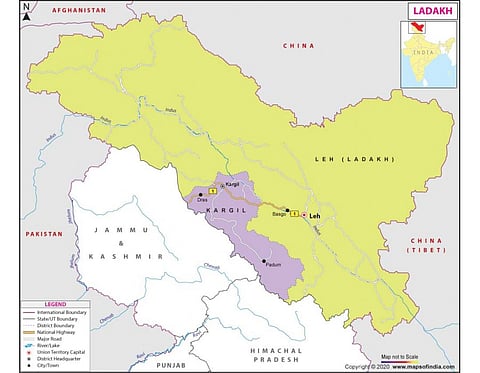

JAMMU: In a ruling that marked a pivotal moment in India’s history, the Supreme Court of India unanimously upheld the abrogation of Article 370 on December 11, 2023.
This landmark decision effectively brought an end to the special provision of the Constitution of India, which had granted limited autonomy to Jammu and Kashmir for decades.
Concurrently, the Parliament passed two crucial bills, the Jammu and Kashmir Reorganisation (Amendment) Bill, 2023, and the Jammu and Kashmir Reservation (Amendment) Bill, 2023, transforming the region’s political landscape. This article explores the significant developments that unfolded in Jammu and Kashmir throughout 2023.
One of the key legislative changes in 2023 was the expansion of the Jammu and Kashmir Assembly. The Jammu and Kashmir Reorganisation (Amendment) Bill increased the total number of assembly seats from 107 to 114. This expansion also marked a first with the reservation of nine seats for Scheduled Tribes.
Furthermore, the Lieutenant-Governor is empowered to make five nominations ostensibly with voting rights. The government reasons this will contribute to a more inclusive political process but the opposition parties have criticised it as ‘undemocratic’ and violative of the principles of representative democracy.
In a sweeping move, approximately 890 Central laws were applied to the Jammu and Kashmir and Ladakh regions, while over 200 outdated State laws were repealed. This overhaul of the legal framework also involved the modification of hundreds of laws.
Security Operations and Militancy
Throughout 2023, security forces in Jammu and Kashmir remained active in their anti-insurgency efforts. Outgoing police chief Dilbag Singh in September reported that 40 out of the 49 militants neutralized in 2023 were foreign nationals. Singh also highlighted the success of a “unique model” involving collaboration among local police, Central Armed Police Forces (CAPF), the army, intelligence agencies, and civil administration.
However, according to the South Asian Terrorism Portal (SATP), the region still witnessed 261 violent incidents, resulting in 134 fatalities in 2023. Of those killed, 33 were security force personnel, 87 were militants, and 12 were civilians. Security forces arrested 122 Over Ground Workers (OGWs), 15 so-called hybrid militants (both terms now used for civilians), and 21 active militants. Surprisingly, seven women were also detained on suspicion of being OGWs for militant outfits.
The International Crisis Group had warned early in the year that Jammu and Kashmir, though temporarily out of the international spotlight, could flare up if not addressed through diplomatic and political means. In August 2019, Prime Minister Narendra Modi’s government made substantial changes to the region’s status, promising to quell militancy and foster economic development. However, experts argue that neither of these goals has been fully realized.
Despite the release of many detained political leaders, Kashmiri political life remained at a standstill throughout 2023. Mainstream politicians, often referred to as “pro-India” by Kashmiris, experienced limited freedom of movement and expression. The Modi government’s unwavering approach to Kashmir, although facing criticism for its failings, showed no signs of re-evaluation.
With India and Pakistan both heading into elections in the first quarter of 2024, there is hope that new governments may work for the resumption of formal bilateral relations, which were suspended in 2019. Much, however, will depend on how the election results pan out.
Additionally, the Supreme Court’s ruling in December 2023 called for conduct of elections in Jammu and Kashmir by September 2024, without giving clear cut directions. It remains to be seen whether New Delhi holds early elections to potentially open the door for New Delhi to re-engage with Kashmiri political leaders. As of now, within the region, this is seen as giving the Indian government a long rope to delay elections in the erstwhile state for some more time.
In conclusion, 2023 was no different year for Jammu and Kashmir, where people continued to live in a pressure cooker situation. The Supreme Court’s decision, along with significant legislative changes and ongoing security operations have brought further challenges for the region’s future.
The path ahead remains uncertain as the political landscape evolves and elections approach, if and when they are held.
Have you liked the news article?